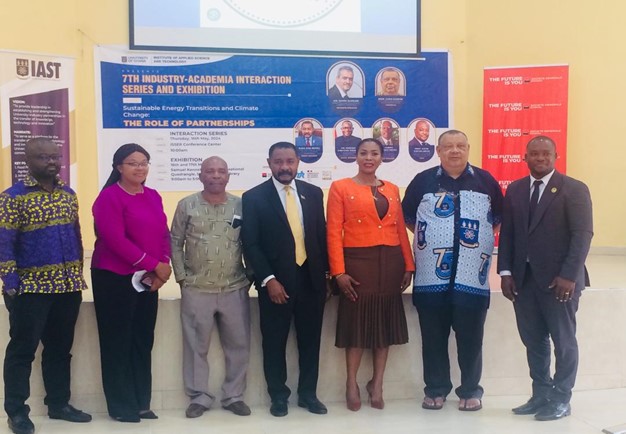By Deborah Asantewaah SARFO
The University of Ghana (UG) has announced plans to commercialise its plastic-to-fuel conversion project.
Since the project aims to address the plastic waste menace, contribute to sustainable energy solutions and make fuel affordable, the university is optimistic about capitalising on the clean fuel it generates.
Director-Institute of Applied Science and Technology (IAST), Professor David Dodoo-Arhin, stated that the decision to scale-up the project was made after a successful proof of concept process involving testing vehicles using fuel produced from plastic waste.
He disclosed this on the side-lines of the institution’s 7th industry-academia interaction series and exhibition, held under the theme ‘sustainable energy transitions and climate change: the role of partnership’
“We will be moving into large-scale production. We have successfully proven the concept, and it worked. So, we intend to scale it up and look forward to welcoming potential partners,” he stated.
The research project commenced in 2018 as a collaboration between the School of Engineering Sciences and IAST, both of UG, with support from the French embassy.
Although there are several ways to recycle plastics, he explained that the strategy used in the current initiative is called valorisation. Its aim is to provide plastics with value while gradually removing them from the environment.
On the particular plastics utilised in the conversion process, he said: “We are looking at single-use plastics including polyethylene bags, polyethylene terephthalate (PET) bottles, among others”.
He noted that his outfit has done some installations of the locally-built reactor or processor for plastics-to-fuel in Osu Alata, and intends to have a training project in June for training about 50 youths in the community on washing, cleaning and segregation of plastics.
“By mid-June, we will start the training project. The training is to empower the youth, especially those who are not employed. They will get into the value chain of collecting the plastics.
“We will train them on how to wash the plastics, how to clean them and segregation, then take them through the process of conversion which is a little bit technical. But currently, we intend to train about 50 community members on this project,” he added.
Moreover, he explained that the plastic project’s goal in Osu is to intercept plastics that are headed straight for the ocean and encourage fishermen to recognise plastics as a valuable material in the production of fuel.
Dr. Dodoo-Arhin described the project as a “game changer” and expressed confidence in the fuel’s affordability advantage, saying: “Looking at what we have done, it’s going to be a little cheaper if we go the way we are running”.
Chief Executive Officer (CEO) of the Private Enterprise Federation Nana Osei-Bonsu, in his presentation, bemoaned the negative implications from high cost of electricity on business.










